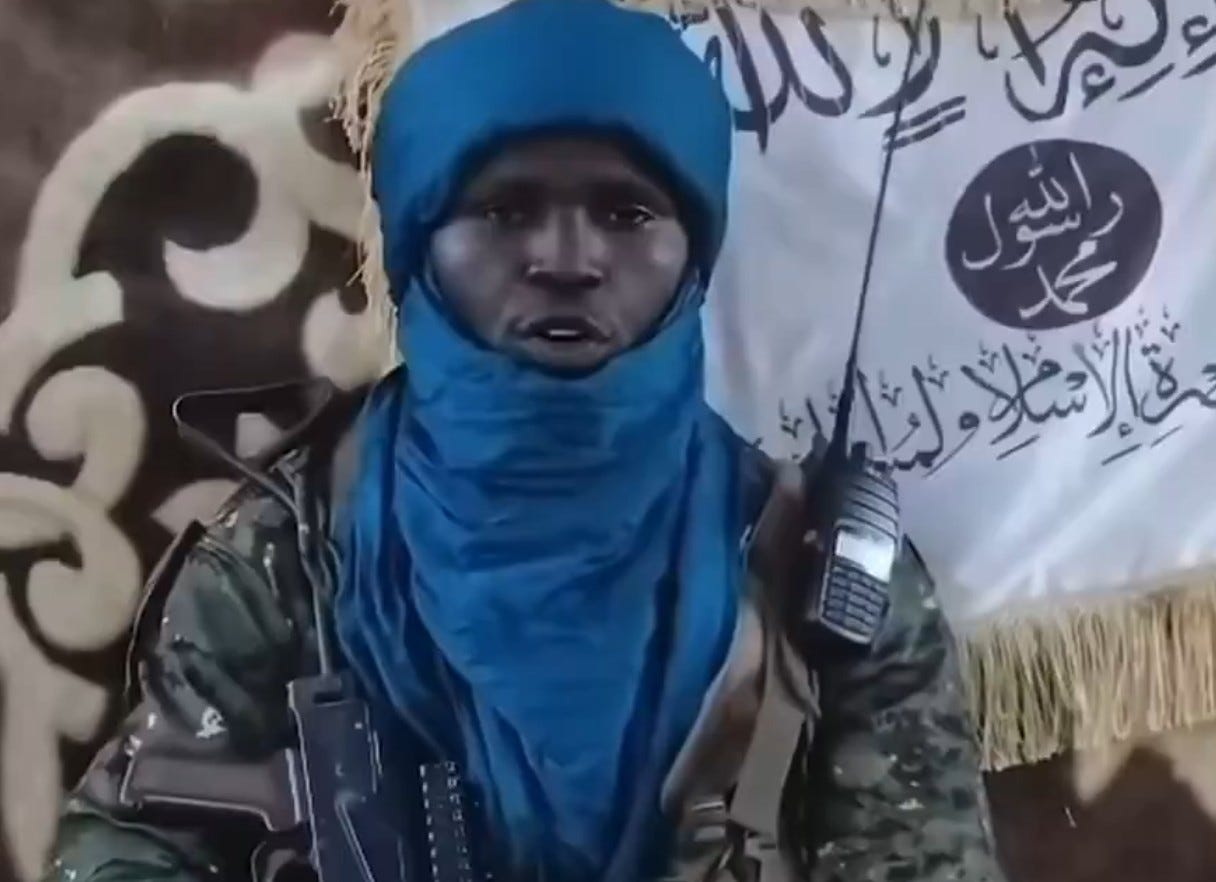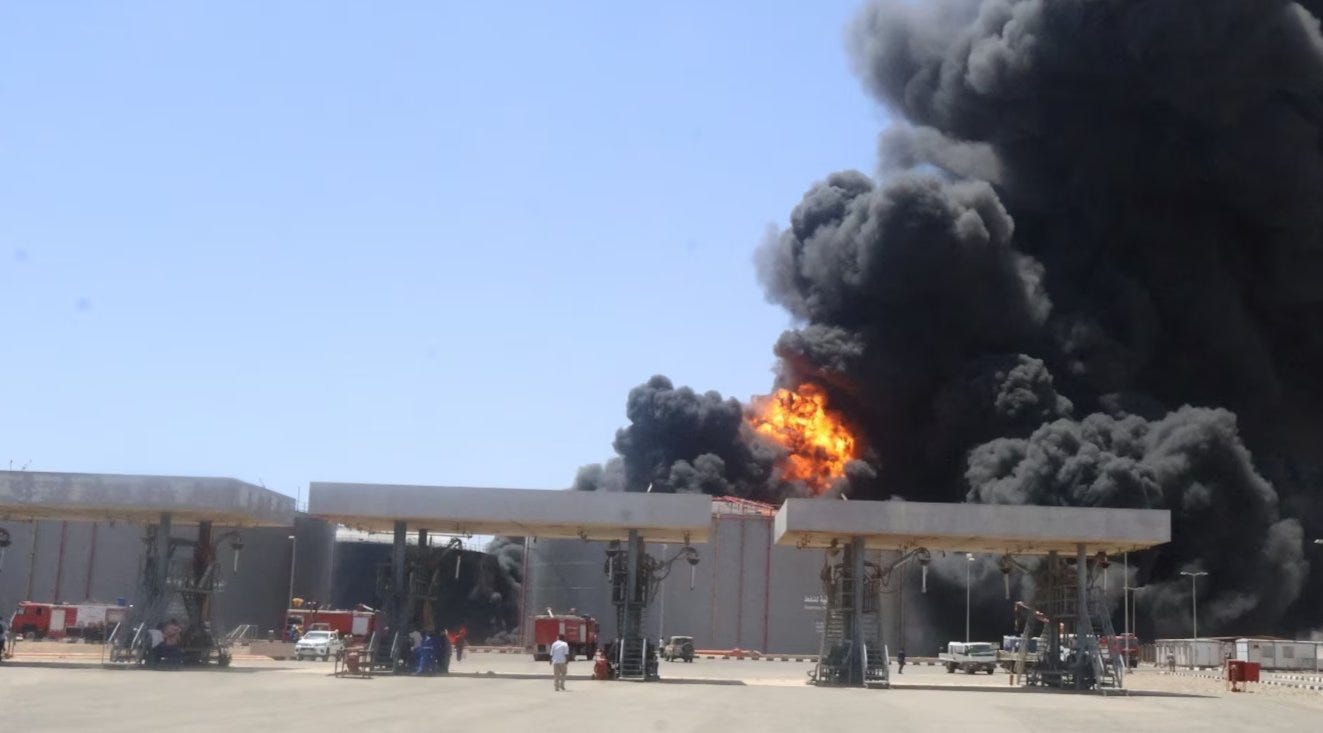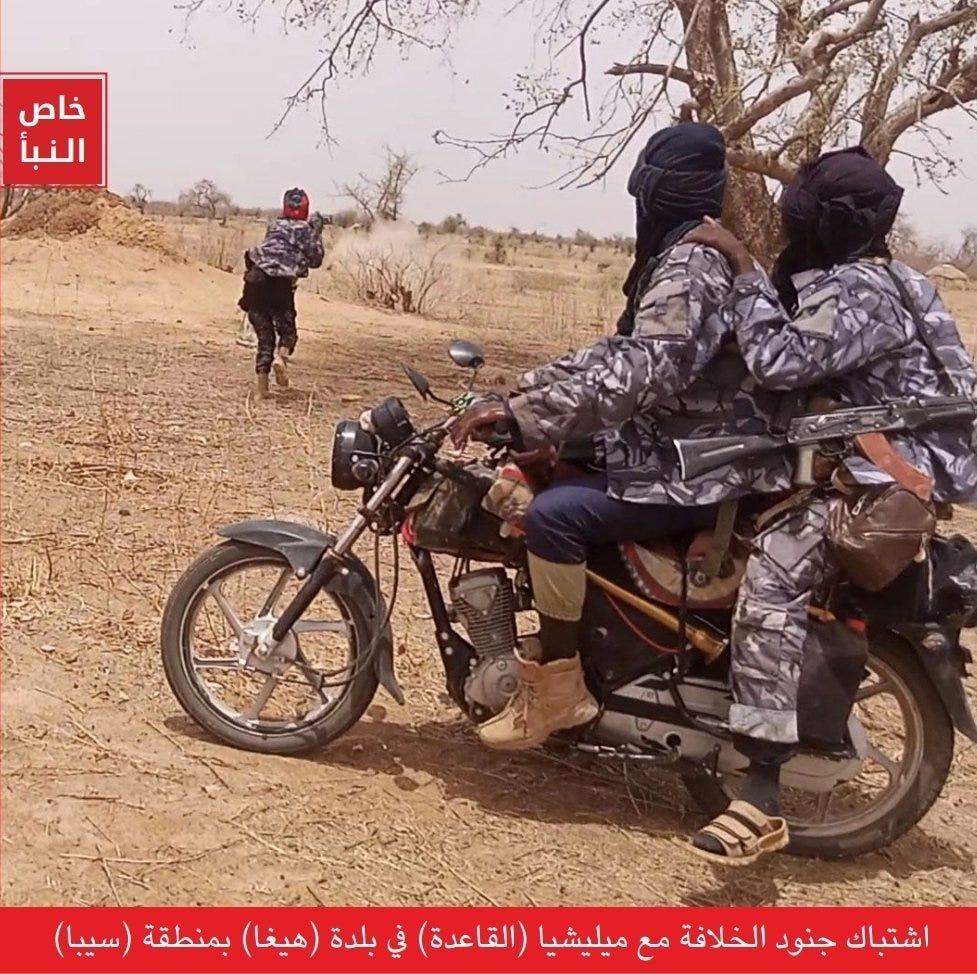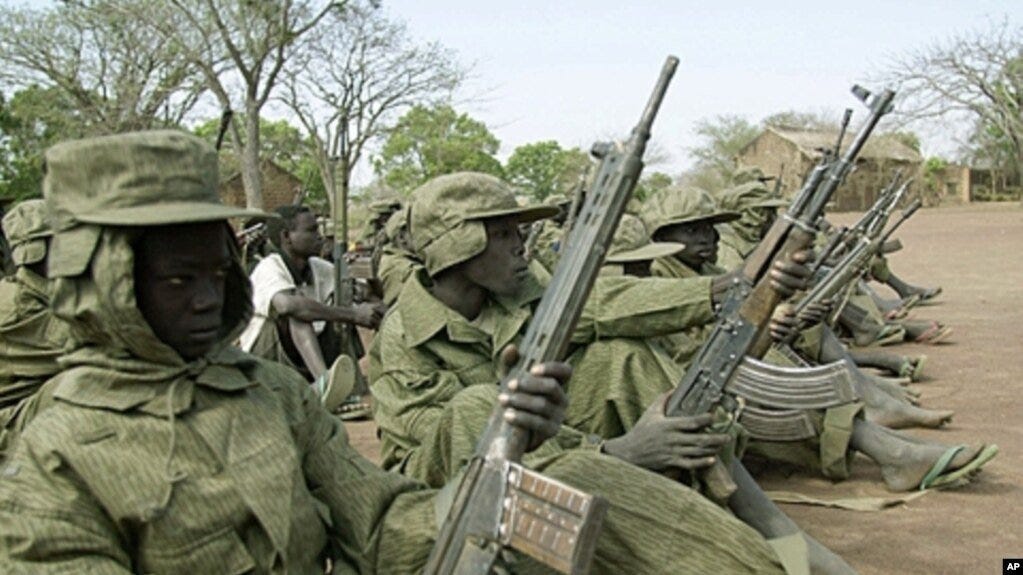The Sub-Saharan Security Review
9 September - 16 September
Weekly Summary:
Recently announcing a ban on fuel imports from neighbouring countries, JNIM has escalated its campaign of economic warfare in Mali. These efforts began several months ago and pose a significant challenge to the military government.
The RSF launched a series of drone attacks to disrupt SAF operations. The SAF reclaimed territory in western Sudan and refused a peace deal proposed by international stakeholders.
IS-SP and JNIM reportedly clashed in northeastern Burkina Faso. According to unconfirmed reports, JNIM suffered significant losses. IS-SP appears to be exploiting JNIM’s focus on Sahelian governments to expand in Burkina Faso.
South Sudan’s First Vice President was charged with murder, treason and crimes against humanity. His party has stated that the decision violates the 2018 peace agreement and called on its supporters to mobilise in protest, raising fears that the country’s fragile peace may imminently collapse.
Ethiopia has inaugurated one of the world’s largest hydroelectric dams. While the project aims to boost economic growth, it has faced longstanding opposition from Egypt and Sudan.
JNIM Ramps Up Economic Warfare in Mali
In recent months, Jama’at Nusrat al-Islam wal-Muslimin (JNIM) has ramped up its pressure on the Malian government by launching a campaign of economic warfare. Since May, the extremist group has attacked factories, industrial sites, infrastructure projects, and artisanal gold mining sites, among other locations, primarily located in western Mali - the country’s economic heartland. Many of the targets were affiliated with international organisations, who were warned in a public message early this summer that they would no longer be able to operate in Mali without JNIM’s permission.
On 3 September, JNIM spokesman Abu Hamza al-Bambari announced that the group would be escalating its campaign by targeting fuel imports from neighbouring countries Senegal, Côte d’Ivoire, Guinea, and Mauritania. He also reaffirmed the group’s desire to blockade the urban centres of Kayes and Nioro, which began on 1 July, and warned Malians against using buses belonging to a well-known local company.
Since the announcement, JNIM has made notable efforts to enact these disruptive measures, with videos quickly emerging showing militants setting fire to fuel tankers, buses, and private vehicles in western and southern Mali. There have also been multiple reports of drivers and passengers being kidnapped at makeshift checkpoints. Among the victims were six truck drivers from Senegal, who have since been released, and a prominent religious leader along with some of his family.
Following a period of silence and relative inaction, the Malian military has sprung to life in recent days via a series of well-publicised operations, yet JNIM has remained undeterred. On 14 September, militants ambushed a massive convoy of over 100 vehicles under military escort. According to reports, security forces quickly fled, allowing the attackers to set fire to at least 40 fuel tankers near the city of Kayes, though the group claims the true figure is closer to 80.
Heavily reliant on fuel and imported goods from its neighbours, JNIM’s campaign is posing a significant, and potentially existential, challenge to the junta. And it is one with no clear solution, with it being nearly impossible to secure slow-moving vehicles travelling along vast stretches of poorly maintained roads from attacks.
Some operators have reportedly struck deals with the group to protect their assets, leading to speculation that the government’s only answer is a negotiated settlement. JNIM would perhaps be open to this possibility, but it would undoubtedly come at a heavy price. However, aware of the junta’s recent internal fissures, the group seems more likely to persist in its efforts to instigate a seismic change by continuing its efforts.
SAF Aims for Military Victory, RSF Conducts Drone Attacks
On the morning of 9 September, RSF drones crashed down across Khartoum state. They targeted the Wadi Seidna military area and the Al-Markhiyat electricity substation in Omdurman, causing a significant energy disruption. A weapons factory in Khartoum’s Al-Kalakla district and Al-Jaili town were also hit.
The military government, based in Port Sudan for much of the conflict, is reportedly seeking to relocate to Khartoum. It recently unveiled an ambitious plan to rebuild the capital, devastated by heavy fighting. The strikes served as a stark reminder of the RSF’s determination to derail a return to normalcy for the capital’s residents.
Five days later, the paramilitary group launched another wave of drone strikes, this time hundreds of kilometres south of the capital. The attacks on Sunday reportedly struck the Sudanese military’s 18th Division headquarters, fuel depots, the Kenana airbase, and the Um Dabakir power station, all clustered around Kosti, a city held by the SAF in White Nile State. Air defences also reportedly intercepted drones over El-Obeid.
There has recently been heavy fighting in Kordofan, where the SAF has launched a fresh offensive to recapture territory from the RSF. The primary goals of this operation include breaking the RSF’s brutal sieges of Dilling, South Kordofan and ultimately El-Fasher, Darfur. Over the past week the SAF captured the town of Bara, which the RSF had used both as a base to attack El-Obeid and as a supply hub for operations in western Sudan, as well as the areas of Kazgeil and Fartangoul.
As this latest operation highlights, the SAF is focussed on obtaining a decisive victory over the RSF, rather than ending the conflict through a negotiated settlement. However, despite its numerous victories this year, it is unlikely to possess the means required to achieve such a significant undertaking. Nonetheless, the military government has allegedly refused a peace proposal put forward by the United States, Saudi Arabia, the United Arab Emirates, and Egypt because of a stipulation barring any belligerent from participating in the post-war transition.
IS Challenges JNIM in Burkina Faso
Recent months have seen the Islamic State Sahel Province (IS-SP) embark on a campaign to expand its territorial control in Burkina Faso, reportedly in hopes of pushing south through the country. The group has conducted sporadic attacks against Volunteers for Defence of the Homeland (VDP) - pro-government militiamen - the Burkinabe armed forces, and its rival Jama’at Nusrat al-Islam wal-Muslimin (JNIM) in the country’s northeast.
On 16 September, IS-affiliated channels claimed that a major clash took place between IS-SP and JNIM near the town of Sebba. According to the report, al-Qaeda’s West Africa branch suffered over 70 casualties, a figure that would rank among the deadliest incidents of internecine violence in recent years. While the information remains unverified, it may mark the beginning of a potentially bloody chapter in relations between the two extremist groups.
After emerging in 2015, IS-SP enjoyed a period of coexistence and cooperation with al-Qaeda linked groups in the Sahel due to longstanding relations between senior members and fighters; IS-SP and AQ groups even occasionally carried out attacks together. The relationship between the two was so unprecedented compared to other theatres of jihadist contestation that it was labelled the “Sahelian exception”.
However, ideological differences, competing territorial ambitions, defections, and opposing governance styles mean this relative peace did not last. Violence between the jihadist groups erupted in 2019 and spiked in 2022 following the withdrawal of the French military from Mali. This period of sustained conflict caused significant losses on both sides, but until this summer, clashes and fatalities had been decreasing.
JNIM’s strength and offensive capabilities have allowed it to significantly confront the Malian and Burkinabe governments this year; these audacious efforts have somewhat overshadowed IS-SP’s recent resurgence. IS-SP’s continued operations in northeast Burkina Faso indicate that JNIM’s focus on pressuring the two countries has given IS-SP an opportunity to use its improved capabilities and larger forces to expand territorially. In the past, JNIM has been regarded as the most effective bulwark against IS-SP, yet the ongoing hostilities between them could reverse these roles.
South Sudan’s First Vice President Charged, Prompting Calls for Mobilisation
South Sudan became the world’s newest nation a little over 14 years ago. Its decades-long battle for independence was pushed for by an unusual mix of actors, with a US-based coalition including politicians, evangelical Christians, and Hollywood figures such as George Clooney throwing their support behind the cause, even though some fighters on the ground were using child soldiers and committing indiscriminate ethnic violence.
South Sudan’s brief history as a nation has hardly been more peaceful than the preceding decades. A bloody civil war erupted in 2013, leading to hundreds of thousands of deaths and the displacement of millions. The conflict ended after Salva Kiir and Riek Machar signed a tenuous peace deal and agreed to share power in a transitional government as president and first vice president, respectively.
The uneasy power sharing agreement was unlikely to last; yet, considering the two men’s fractious history, it is perhaps a miracle that it held until this year. In March, amid mounting tensions between Kiir and Machar, an ethnic militia with ties to the first vice president overran a military base. The attack triggered a chain of events that led to the arrest of First Vice President Machar and several of his key allies, placing the country in a state of volatility.
This week, Machar was charged with murder, treason and crimes against humanity for his alleged role in the attack. His party has stated that the decision violates the 2018 peace agreement and called on its supporters to mobilise in support of their country and enact a regime change, raising fears that the country’s fragile peace may imminently collapse.
Machar’s complicity in the attack remains unclear, though a leading civil rights figure has accused President Kiir of intentionally orchestrating the political crisis. Aside from political control, this potential plot was likely motivated by financial gain. A UN report has revealed that a small group of elites have plundered billions of dollars instead of providing basic services since the country gained independence, highlighting the lucrative nature of power in South Sudan.
Ethiopia Inaugurates Controversial Dam
On 7 September, Ethiopia inaugurated the Grand Ethiopian Renaissance Dam (GERD), situated on the Blue Nile. The ambitious project, which took over a decade and cost $5 billion to construct, has become a focal point for the east African nation’s development strategy and national identity. Following its unveiling, an analyst told the BBC that Ethiopians “do not see it as a pile of concrete in the middle of a river, but as a monument of their achievement” due to the significant contributions many Ethiopians made in funding Africa’s largest hydroelectric project.
For the Ethiopian government, which has been grappling with growing instability in recent years, driven by ethnic insurgencies and the fallout of the Tigray war, the GERD’s inauguration has come at a welcome time. The dam will boost the Ethiopian economy by improving electricity supplies for the millions across the country and allowing it to sell energy to nearby countries.
Despite its huge potential, the dam carries the risk of putting Ethiopia at odds with its neighbours. The Blue Nile, which supplies most of the Nile’s water, flows through Sudan into Egypt, two countries that perceive the GERD as “an existential threat”. For Egypt, the river provides over 90% of the country’s freshwater and plays a central role in its agriculture industry, a vital resource for its growing population. Meanwhile in Sudan, there are fears of potential flooding or water shortages depending on Ethiopia’s management of the dam - scenarios that could complicate its already dire humanitarian situation.
Years of negotiations between the three countries “to guarantee water flow, operational coordination and safety measures and a legal mechanism for resolving disputes” have yet to yield an agreement, making the GERD a potential flashpoint for tensions in the region for decades to come, when water is bound to become increasingly scarce.







Thank you for keeping us updated on the Sudanese civil war. This is so important.